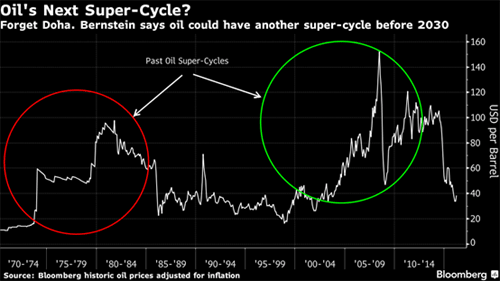“If all major producers don’t freeze production, we will not freeze production,” said Saudi Prince Mohammed bin Salman. He’s the man driving the Saudi oil express. And he’s driving a hard bargain with Iran. “If we don’t freeze, then we will sell at any opportunity we get.”
By “we” he ostensibly meant all other Opec producers (and Russia). But reading between the lines, he probably meant Iran. The Saudis must reckon they can win an oil price with a war. The kingdom pumps out more oil than almost anyone else in the world, at 10.3 million barrels per day. It’s also famous for having more spare capacity than everyone else.
Think about that though. The “oil weapon” used to be about punishing oil importers with higher prices. Now it’s about punishing production competitors with lower prices. A lot can change in a world driven by technological change! The geopolitical pieces are moving.
By the way, not everyone agrees that a producer price war will take prices lower. That’s what normally happens. And that’s what you’d want to prepare your portfolio for. But is there another “super cycle” in the oil market? One research firm thinks so.
Sanford C. Bernstein reckons there’s life in the old bull yet. Or at least one more big cycle driven by tight demand and inelastic supply. The firm released research in which it concluded:
We believe that there could be one more super-cycle in oil before demand peaks in 2030-35… Assuming tight oil peaks out before demand does, it could result in another period of supply tightness as OPEC becomes a dominant force in supply, just as it did in the 1970s.
Hmm. There’s an awful lot of assuming in a forecast like that. First off, we know past performance is no guide to future performance. But the forecast also assumes that the technology driven recovery rates in oil production (fracking) have peaked out (or will peak out). They may. But do you know when?
And how do we know that demand will peak in 2030? Is that when China will move from an energy-intensive phase of growth to more economical energy use? Or is it just… a forecast?
Not that there’s anything wrong with forecasts. But a forecaster has to know his limitations. And 14 years is a long time from now, given how much is changing in the oil world. But the real risk to a long-term forecast right now is not geopolitical. It’s technology.
A lot is changing in the energy world. Opec may never become a dominant force in supply again. Or, it may be the dominant force in supply for a commodity in which demand has drastically changed. The factor no one can predict is the extent that disruptive technological innovation is changing the energy market profoundly.
Category: Economics


